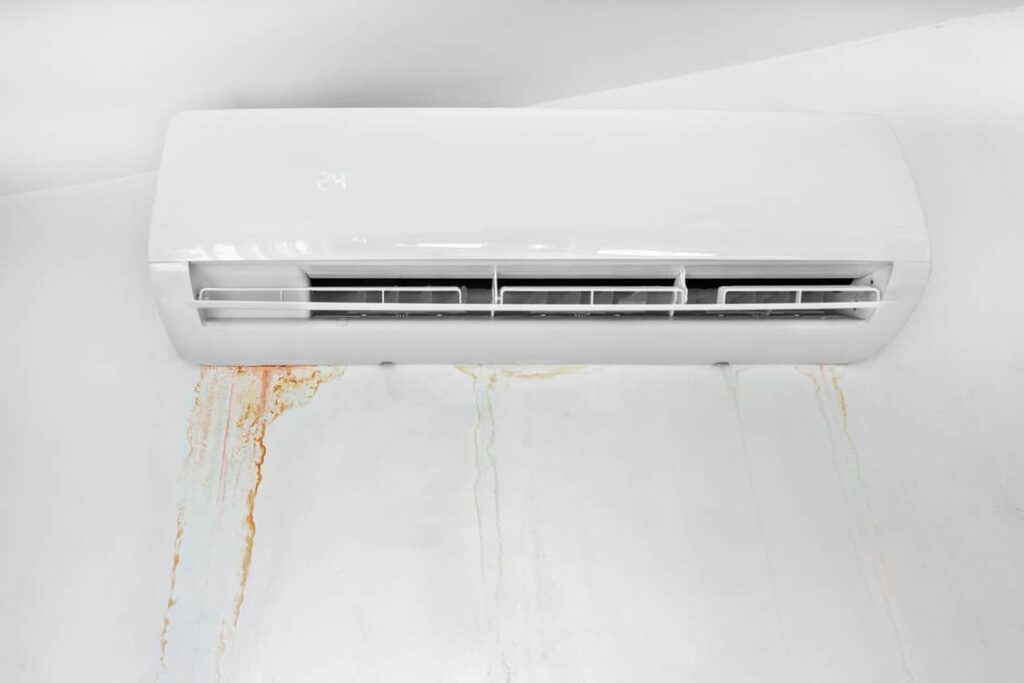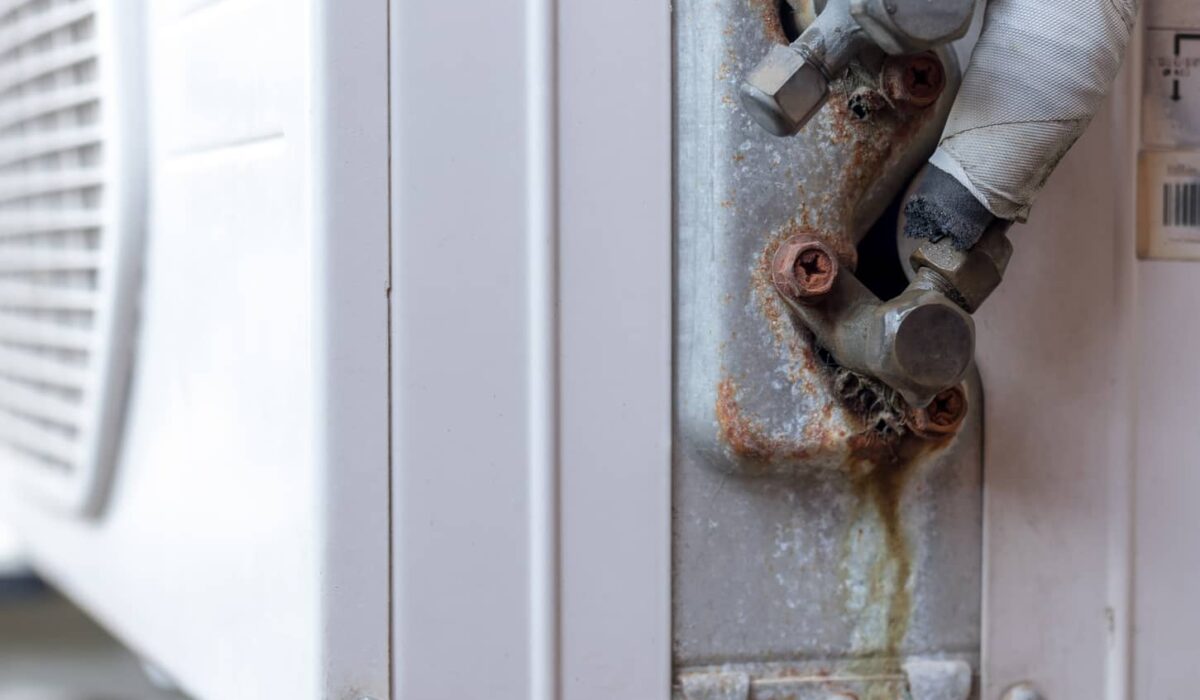Pulling into your garage after a weekend away, you notice water on the floor of your garage. Where is it coming from? You look around and see it is coming out of the back of the AC unit. You take a look at the air handler inside your home and see that water is underneath. This is something you want to tend to quickly as AC is very important for homeowners to have working, especially when the weather is very warm. Is water dripping from the AC dangerous? It is not dangerous, but it means there is a problem that you want to solve before there is damage done.
Let’s take a look.

Why Is My AC Leaking Water?
Water leakage from an AC unit can be caused by several factors. Some common reasons include:
- Clogged condensate drain line: Over time, dust, dirt, and debris can accumulate in the condensate drain line, leading to blockages and causing water to back up and leak out.
- Frozen evaporator coil: If the evaporator coil becomes frozen due to various issues such as a dirty air filter or low refrigerant levels, it can eventually melt and result in water leakage.
- Improper installation: Poor installation practices can cause issues with the AC unit’s drainage system, leading to water leakage problems.
- Damaged drain pan: A cracked or damaged drain pan can cause water to leak out of the AC unit instead of being properly collected and drained away.

Is Water Dripping From the AC Dangerous?
In most cases, water dripping from an AC unit is not inherently dangerous. However, there are some potential risks associated with this issue that should be addressed:
Property Damage
Water leakage can cause damage to your walls, floors, carpets, furniture, or any other belongings near the AC unit.
Mold and Mildew Growth
Excess moisture from water leakage can create a favorable environment for mold and mildew to grow, which can have negative health effects and further damage your property.
Electrical Hazards
If water comes into contact with the electrical components of the AC unit or surrounding wiring, it can pose a risk of electric shock or short-circuiting.
What Are the Dangers of Water Dripping From AC?
The dangers associated with water dripping from an AC unit include:
Health risks: Mold and mildew growth due to excessive moisture can lead to respiratory issues, allergies, and other health problems.
Structural damage: Continuous water leakage can weaken structural components such as walls, ceilings, and floors, potentially leading to costly repairs.
Electrical hazards: Water coming into contact with electrical connections can cause electrocution or damage to the electrical system.
What Should You Do if Water is Dripping From the AC?
If you notice water dripping from your AC unit, here are some steps you can take to address the issue:
- Turn off the AC: Switch off the power to the AC unit to prevent further water leakage and potential electrical hazards.
- Check for obvious issues: Inspect the drain pan, condensate drain line, and filters for any visible blockages or damage.
- Clear the condensate drain line: If the drain line is clogged, use a wet/dry vacuum or a brush to clear the blockage. Alternatively, you can try using a mixture of vinegar and water to dissolve accumulated debris.
- Replace damaged parts: If the drain pan or any other components are cracked or damaged, consider replacing them to prevent future leaks.
- Monitor the system: After addressing the issue, observe if the water leakage stops. If the problem persists, it may be necessary to seek professional help.
Other Recommended Maintenance
Now that you know about water leaking from the AC, let’s take a look at other areas of recommended maintenance. One of those is how long an HVAC system lasts. They usually last about 10-15 years with proper maintenance, but depending on if you live in a coastal town or if chemicals are used in the home, it could be shorter.
Another is getting rid of the musty smell from the HVAC. This can be due to mold growth in the ductwork due to a dirty evaporator coil or it is the air filter. Checking all of these areas is a good idea.
Lastly, turning up the temperature on the water heater. This will depend on whether it is electric, gas, or tankless as to how to turn up the temperature. The temperature should be between 120 degrees F and 140 degrees F.
When Do I Call a Professional?
While some AC leakage issues can be resolved through basic troubleshooting, there are instances where professional assistance is required. You should consider contacting a professional if your attempts to resolve the issue have been unsuccessful. Also, if the water leakage is extensive or causing significant property damage. You might also call a professional if you suspect a more complex underlying problem, such as compressor issues or refrigerant leaks. Lastly, you are not confident in performing the necessary repairs or maintenance yourself.
Conclusion
Water dripping from an AC unit can be a nuisance and potentially lead to various problems. By understanding the causes, potential dangers, and appropriate steps to take, you can address this issue effectively. Remember, if in doubt, it is always better to seek professional assistance to ensure your AC system’s proper functioning and prevent further damage. While you are taking care of your HVAC unit, this is a great time to reach out to Edifice Inspections in Peachtree Corners, GA for a full home inspection


3 Comments
Comments are closed.